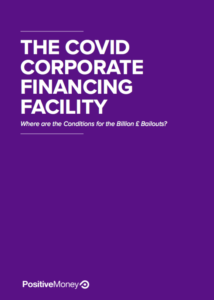The Covid Corporate Financing Facility

Where are the Conditions for the Billion £ Bailouts?
The Covid Corporate Financing Facility (CCFF) is a Bank of England and HM Treasury scheme implemented in response to the economic fallout of Covid-19. It is a highly exclusive and privileged facility, designed to provide the UK’s biggest corporations with access to billions of pounds in cheap loans directly from the Bank of England. The terms of these loans are significantly more favourable than those offered to the country’s SMEs, who face far higher interest rates on commercial bank emergency loans.
PDF Download:
Download full report here (Free, PDF, 32 pages)
In propping up big corporations without attaching social or environmental conditions, the CCFF is inconsistent with the government’s pledge to ‘build back better’ towards a fairer, greener, and more resilient economy. The CCFF’s few existing conditions related to corporate governance are insufficient and poorly designed. As a result, many companies are benefiting from public money while simultaneously paying out dividends to shareholders, laying off workers, and harming the environment. Further, the CCFF currently lacks transparency, deepening the democratic deficit at the Bank of England.
This report proposes five simple recommendations to improve the CCFF and align it with efforts to build back better. Specifically, we outline how the Bank of England and the Treasury can strengthen the existing conditions of the scheme, introduce new conditions that protect both workers and environment, implement mechanisms to ensure compliance, and enhance the transparency of the scheme.
The Treasury and the Bank of England should:
Extend the scheme’s existing conditions by implementing restrictions on senior pay and a one year moratorium on capital distributions for all companies participating in the CCFF.
Require CCFF participants to guarantee: (i) no lay-offs while the Coronavirus Job Retention Scheme (CJRS) is in place; (ii) immediate inclusion of worker representation on company boards; and (iii) union consultation in any future restructuring of the workforce when the CJRS comes to an end.
Require that each company, in their letter of commitment to the Treasury, outline credible net-zero carbon plans in line with the Paris Agreement and commit to disclosure of climate risks as recommended by the Task Force on Climate-related Financial Disclosures.
Outline clear consequences for failure to comply with the conditions of the CCFF, such as a financial penalty and less favourable terms and conditions in further bailout schemes.
Enhance the transparency of the CCFF by publishing: (i) total amounts borrowed by each company since the start of the scheme; (ii) a detailed explanation of how eligibility is determined and how loan amounts are agreed upon; and (iii) all letters from companies explaining how conditions are being met.
PDF Download:
Download full report here (Free, PDF, 32 pages)